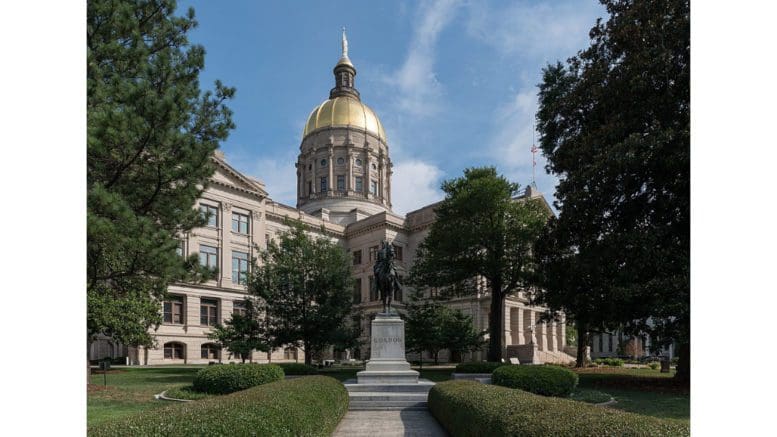by Ross Williams, Georgia Recorder [This article first appeared in the Georgia Recorder, republished with permission]
February 14, 2023
Georgia lawmakers are considering a bill that opponents compare to Florida’s “Don’t Say Gay” legislation, which seeks to limit the way teachers and others responsible for caring for minors can answer questions about the child’s sexual orientation or gender identity.
The bill, authored by Republican Sen. Carden Summers of Cordele, got its first debate at a Senate committee hearing Tuesday, but lawmakers did not vote on it. At the start of the hearing, Summers said he plans to bring the bill back with changes to accommodate criticism from parents and educators.
As written, the bill bars teachers, librarians, camp counselors and others responsible for watching over people 16 and under from engaging in discussion about “information regarding a child’s sexual orientation or gender identity, other than the child’s biological sex” without written permission from the parent, even if the child starts the conversation.
It mandates that a student’s official record must be kept under their legal name at the time of enrollment and their name or gender on the record cannot be changed unless the school receives a copy of the child’s birth certificate and a form signed by all of the child’s parents.
It also bars caregivers from instructing while “dressed in a sexually provocative manner, applying current community standards,” a provision likely aimed at drag performers.
Young LGBTQ teenagers may feel more comfortable opening up about their personal feelings with a trusted teacher or guidance counselor than their parents, said Georgia State University law professor Anthony Michael Kreis, but the bill could prevent those adults from helping.
“The state would be imposing an arbitrary barrier to vulnerable children seeking age appropriate guidance,” he said. “And even transgender students who have the support of their parents will be unable to have appropriate recognition by their schools of their gender identity without involving the state in official changes to a child’s birth certificate.”
Kreis said that raises serious constitutional issues.
“There is no rational basis to deny a student the equal protection of the law by mandating unnecessary hoops for gender non-conforming students to be acknowledged by their school with parental permission,” he said. “This is little more than a bare desire to harm, which is not a legitimate basis to legislate under the Fourteenth Amendment.”
According to the American Civil Liberties Union, state legislatures across the country are considering 310 anti-LGBTQ bills this year, 144 of which are related to schools or education. Georgia’s bill would stand out from the others in part because of its age limit of 16, said Carl Charles, senior attorney with Lambda Legal, an LGBTQ legal advocacy group.
“Many of the bills, at least the one in Florida that passed last year commonly referred to as the ‘Don’t Say Gay’ bill, was modified to really focus almost exclusively on children in grades K through third grade, and so the arguments there about what’s appropriate discussion for the classroom are really narrowed. This is really expansive. I will also note that the language in the bill is not just limited to school staff.”
The bill refers to anyone acting in loco parentis, a legal term meaning “in place of a parent,” which could present further legal challenges, Charles said.
“This includes literally any adult a minor 16 or under speaks to,” he said. “That is a camp counselor. That’s a sports coach. That’s a person who coordinates after school activities. That’s a daycare worker. That’s what puts this bill, should it pass with this particular language, into the realm of vague such that a person can’t look at this and know what conduct is prohibited.”
Dozens of people signed up to speak at the committee hearing, but Committee Chairman Clint Dixon said the meeting would have to be cut short after only two people spoke because another committee needed to use the room.
Gwinnett mom Elizabeth Wagner said she had planned on telling the committee about the supportive community her transgender child found in his school.
“Politicians have no business telling me how to raise my child,” she said. “My child has had role models in school, been supported in school. This bill aims to take away all of that.”
Transgender children are at higher risk of suicide because of the stigma they often face, and Wagner said it is all too common to meet transgender kids with families that do not support them.
“There are a lot. I know those children. I sent Christmas presents to those children in college who were not allowed to go home for Christmas. So don’t think that that is an anomaly.”
Tom Rawlings, a child welfare attorney who presented the bill with Summers, said the final product will incorporate changes.
“We simply want to make sure that, in appropriate cases, that parents know what’s going on with their children and that educators and administrators are not hiding that fact, except when it’s appropriate,” said Rawlings, who headed the Georgia Division of Family and Children Services and who was fired after an altercation in which he called an off-duty police officer “boy” and “son.” “So what we need to do on the bill, I’ll acknowledge, is that we need to make sure that we are putting the onus not to talk about these issues on the teacher, but not the child.”
“We know that there may be children who are having some gender identity issues, may wonder about what’s going on with them, especially as they hit puberty, and they may want to talk to someone about it,” he added. “They may be rejected by their parents if they’ve already perhaps shown some gender identity issues at home or wanted or indicated an interest in transitioning at home. So we want children to be able to speak to a trusted adult about this.”
Atlanta Democratic Sen. Sonya Halpern said she’s hopeful that kind of context will find its way into the bill.
“I think that there is such a thing as a school and home partnership. And what I would love to see when this bill comes back to us is a less cynical view of the school part of that partnership, because I get it. I’m a parent too, I would hate to think that there are other adults in this world who know things about my child that I don’t because my child is telling them and is not telling me, but at the same time, I realize in reality, that’s probably true, there’s some things that children are never going to go to their parents for but need a trusted adult in the larger village that they can go to.”
Dixon said the author will have the chance to present the modified version and promised the audience they will have the chance to sound off on it.
“We will be having another hearing on this, seeing the interest in this, but we will make sure we’ll get notice out to everyone and plan enough time you can make your schedules,” he said.
Georgia Recorder is part of States Newsroom, a network of news bureaus supported by grants and a coalition of donors as a 501c(3) public charity. Georgia Recorder maintains editorial independence. Contact Editor John McCosh for questions: info@georgiarecorder.com. Follow Georgia Recorder on Facebook and Twitter.



